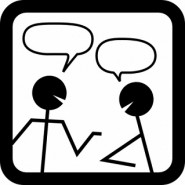If you want any kind of public success as a musician, you’re not going to do it on your own. You’re going to need other people. You’ll need to know other musicians, promoters, engineers, record label folks and, most importantly of all, your audience.
In order to meet and get to know these people you’re going to need to ‘network’.
‘Networking’ is an awful term. It’s presented to us by business and career development books as if they were bestowing some magnificent gift, the elusive secret to success. It conjures images horrible images: Self-important suits with insincere smiles foisting business cards on anyone who looks important while trying to hide the dull glint of desperation in their eyes. Schmoozing politicians ‘pressing the flesh’ and ‘working the room’. The sales pitch unwelcomely inserted into ordinary human interaction.
Networking in Action
It doesn’t have to be like this. What does ‘networking’ actually mean? It means talking to people. Having a chat. Getting to know them. Finding out a little bit about them. Telling them a little bit about you. Making small talk. The kind of conversation you’d have with a friend of a friend you’d just been introduced to. Don’t try to figure out what you can get out of them. Don’t launch in to your ‘elevator pitch’. Just chat. If you’re thinking ‘what can this person do for me?’, you’re doing it wrong.
Breaking the Ice
Some of us find it difficult to strike up a conversation with strangers. I know I do. Here’s what to do. Next time you’re representing your music or band somewhere go up to someone you don’t know, stick out your hand for a handshake and say “Hi, I’m Joe Bloggs, guitarist in Band Name.” Try to smile while you’re doing it. (Please substitute your own name, instrument and band or you’ll get some funny looks).
Almost always, the person will shake your hand and introduce themselves back to you. If they don’t then a quick question should encourage them to open up a bit. Something like “Are you with one of the bands?”
Keeping the Conversation Going
Once you’ve started the conversation the key to keeping it going it so ask questions. Questions encourage the person you’re talking to to speak more. Listen carefully to what they say. Then ask another question, based on what they’ve been telling you. That shows you’ve been listening and keep them talking.
This technique is invaluable because most people would rather talk about themselves than listen to you talk about yourself. If you only start a conversation so you can talk endlessly about you and what you think you will quickly become known as a bore. If you can show genuine interest in the other person and ask relevant, perceptive questions, you will become a sparkling conversationalist.
It can be worth having a few stock questions for lulls in the conversation. Travel and the weather are traditional but unoriginal. Try to think of something specific to music. If they’re in another band how did they get this gig? How long has the band been going? How long have they been in the band? Have they played this venue before? Do they know any of the other bands playing? Are they promoting a new album / EP / single?
One important point is that it doesn’t matter if you already know the answer to the question. Ask it anyway. The idea is to encourage them to speak. You are listening to what they have to say. At the very least you’ll hear the answer from their perspective. You might even learn something new or different to what you thought you knew. Ask the question anyway.
The person may ask you a question about yourself, in which case it’s fine to give a brief answer but try to end with a question that turns the conversation back to them.
That’s it, Job Done…
Is that really all there is to it? Well, no. There’s plenty more you can do and I’ll blog more on this in future. However, if you’ve managed a couple of minutes of sincere, genuine, two-way conversation then you’ve got the hard part out of the way. You don’t have to become best friends. You don’t have to talk for hours. Just find out who they are and learn a little bit about each other. When the conversation finishes try to remember their name and maybe one or two things you talked about. That way if you bump in to them in the future you can bring up those same topics. This shows you were paying attention. If it’s gone really well invite them to look you up on Facebook, Twitter, etc.
The Brush Off
Sometimes it won’t work. The person won’t be interested. You’ll ask a few questions and get mono-syllabic disinterested responses. The conversation peters out after a few seconds. It doesn’t matter, move on. You won’t win them all. A 50% success rate is pretty good. Some people won’t be in the right mood, will have other things on their mind or just aren’t sociable in that way. Don’t let it get to you. At least you tried.
Whether you’re successful or not, once you’re done find another person you don’t know and do it all again.
The book How to Win Friends and Influence People by Dale Carnegie is an invaluable source of information for this kind of thing. It was written nearly 80 years ago and is as valid today as it was then.
Let me know if you have any stock questions you use to break the ice – I’m always on the look out for more.






I have a question! What’s a good way to end conversations when networking?
Good question. The ‘old-faithful’ techniques are going to the toilet, getting a drink, getting some food, or finding your drink if you’re at a party and you’ve put it down somewhere. However, we can be more creative than that.
At a music or band event there are plenty of reasons you might have to excuse yourself. I might say something like “If you’ll excuse me I just need to…
– track down insert band member name of your choice.
– check on my guitar / amp / violin / stage set-up / etc.
– check on the merchandise table.
– make sure my partner is OK.
– see if insert name needs a hand with something.
– talk to insert name, they’ve just arrived and I haven’t spoken to them yet.
– talk to insert name, I promised I’d catch up with them earlier.
– find out if insert name, has arrived, I don’t want to miss them.
– make sure I’ve got everything ready to go on stage.
– go and warm up a bit.”
You’ll probably think of more. Obviously pick one that’s plausible and relevant to that particular time and situation.
However, you don’t have to agonise over the reason too much. This is really just a polite way of ending a conversation. As long as you start with “If you’ll excuse me I just need to…” and give a plausible reason, that’s the accepted code for “I’m ending this conversation now”, without seeming blunt or rude.
Pingback: Networking 2: In Defence of Small Talk - Matt Helm Guitar
Pingback: Laying Foundations - Keep an Eye on the Long Term - Matt Helm Guitar
Pingback: Networking 3: Remembering Names - Matt Helm Guitar